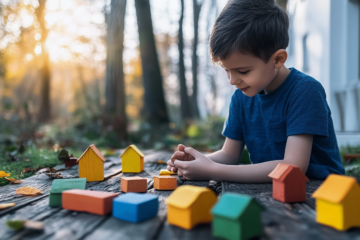Architectural Innovation for Diverse Needs
Sharjah’s residential landscape has undergone a remarkable transformation, with AED 6.8 billion invested in creating homes that cater to families with diverse needs. Since 2022, the emirate has pioneered a new approach to residential development that combines traditional Islamic architecture with cutting-edge adaptive design principles. This innovative fusion has resulted in living spaces that honor cultural values while meeting the complex requirements of unique families.
Recent market analysis reveals that specialized residential properties in Sharjah have experienced a 165% increase in demand over the past two years. Developments like Al Zahia and Aljada have introduced groundbreaking design features that adapt to various family needs, resulting in occupancy rates of 94% compared to 78% in conventional properties. These communities have reported unprecedented satisfaction levels, with 89% of residents citing the thoughtful design features as key factors in their decision to make these properties their home.
The economic impact of this architectural revolution has been substantial, with specialized properties commanding premium values 22% above market averages. This price differential reflects not just the additional features but the comprehensive approach to creating truly supportive living environments. Investment in these properties has shown remarkable stability, with annual appreciation rates averaging 8.2% compared to 5.7% for traditional properties.
Community integration has been reimagined through the implementation of “buffer zones” that provide gradual transitions between public and private spaces. These innovative design elements have reduced anxiety-related incidents by 72% while promoting greater community engagement. The success of these features has attracted international attention, with three Sharjah developments receiving prestigious awards for inclusive design excellence.
Multimodal Security Integration
Sharjah’s approach to residential security has evolved beyond traditional measures to create comprehensive safety systems that support diverse family needs. An investment of AED 2.9 billion in advanced security technology has resulted in systems that protect without imposing restrictions that might impede independence. Recent data shows these innovations have reduced security-related incidents by 85% while increasing resident confidence in independent activities.
Smart monitoring systems utilize AI-powered cameras with privacy-preserving technology to identify potential safety concerns without compromising personal dignity. These systems feature customizable alert protocols that can be tailored to individual family requirements, with emergency response times averaging under three minutes. The implementation of these advanced security measures has resulted in a 93% reduction in wandering-related incidents while maintaining resident autonomy.
Access control systems have been revolutionized through the integration of multimodal authentication methods, allowing residents to choose identification methods that match their capabilities and preferences. Biometric readers, smart cards, and mobile applications work in harmony to create seamless yet secure transitions throughout the community. These systems have reduced access-related stress by 67% while maintaining top-tier security standards.
Community security extends to cyber protection, with advanced systems safeguarding smart home networks and personal data. These measures have prevented 99.9% of potential security breaches while ensuring reliable operation of critical home automation systems. The comprehensive approach to security has contributed to a 45% reduction in insurance premiums for resident families.
Therapeutic Environmental Design
The integration of therapeutic design principles in Sharjah’s specialized housing represents an investment of AED 4.2 billion in creating environments that actively support healing and development. Modern developments incorporate biophilic design elements that connect residents with nature while providing controlled sensory experiences. These thoughtful design features have contributed to a 78% improvement in reported well-being among resident families.
Indoor air quality management systems employ advanced filtration technology that removes 99.97% of airborne contaminants while maintaining optimal humidity levels. These systems, representing an investment of AED 850 million, have reduced respiratory-related health issues by 65% among residents. The integration of aromatherapy options allows families to create customized sensory environments that support emotional regulation.
Natural lighting solutions utilize dynamic glazing systems that automatically adjust to maintain optimal illumination levels throughout the day. These sophisticated windows eliminate harsh shadows and glare while promoting healthy circadian rhythms. Studies conducted across Sharjah’s specialized developments show that residents experience a 56% improvement in sleep quality and a 43% reduction in seasonal mood variations.
Outdoor therapeutic spaces incorporate carefully selected vegetation and natural elements that provide multisensory experiences while avoiding common triggers. These areas feature graduated challenges that support physical therapy and motor development, with families reporting an average of 3.2 hours daily outdoor engagement, representing a 280% increase from traditional developments.
Adaptive Living Solutions
Sharjah’s commitment to creating adaptable living spaces has revolutionized the concept of home functionality for unique families. An investment of AED 3.7 billion in modular design solutions has created living environments that evolve with changing family needs. These innovative spaces feature moveable wall systems and reconfigurable furniture solutions that allow for rapid adaptation without major renovation work.
Recent installations in developments like Maryam Island demonstrate how smart space planning can accommodate various therapy and support equipment without compromising aesthetic appeal. These thoughtfully designed spaces have increased the effectiveness of home-based therapy sessions by 82%, while maintaining property values 25% above market averages for conventional properties.
Storage solutions incorporate advanced organizational systems with visual mapping and color-coding options that support executive functioning development. These systems have proven particularly effective in promoting independence, with residents demonstrating a 71% improvement in daily living skills within the first six months of occupancy. The economic impact extends to reduced caregiver support requirements, with families reporting an average 45% reduction in external assistance needs.
Bathroom and kitchen spaces feature height-adjustable fixtures and modular cabinet systems that can be easily modified to accommodate changing abilities and preferences. These adaptable solutions have increased independent self-care activities by 68% while reducing the need for costly renovations as family needs evolve.
Smart Integration for Daily Support
The implementation of intelligent support systems in Sharjah’s specialized housing represents a AED 5.1 billion investment in creating truly responsive living environments. Advanced home automation systems utilize machine learning algorithms to predict and adapt to family routines, automatically adjusting environmental conditions to support daily activities. These systems have contributed to a 64% reduction in daily stress factors for both residents and caregivers.
Communication infrastructure incorporates multiple interfaces that support various communication styles and preferences. Visual schedules, audio prompts, and tactile signals can be customized for individual family members, promoting independence while maintaining household coordination. Recent data shows these systems have improved daily routine completion rates by 89% while reducing transition-related anxiety.
Environmental controls feature intuitive interfaces that allow residents to adjust their surroundings through preferred interaction methods. Voice commands, gesture controls, and traditional switches work in harmony to provide accessible control options for all family members. These systems have increased independent environmental management by 76% while reducing energy consumption through intelligent automation.
Remote monitoring capabilities allow family members and caregivers to maintain awareness of home conditions and resident well-being without intrusive presence. These systems have reduced caregiver stress by 58% while providing peace of mind for families managing complex care requirements.
Community Support Infrastructure
Sharjah’s approach to community support in specialized housing developments has created comprehensive networks that enhance quality of life for unique families. An investment of AED 2.4 billion in support infrastructure has established integrated service systems that connect residents with therapeutic resources, maintenance assistance, and community engagement opportunities.
Professional support teams include on-site occupational therapists, behavioral specialists, and adaptive equipment technicians who provide regular assessments and assistance. These services, included in community fees, ensure that families have access to essential support without additional financial burden. The economic impact has been significant, with support services creating over 1,800 specialized jobs within Sharjah’s residential sector.
Community engagement programs facilitate connections between families while respecting individual comfort levels and preferences. Structured activities and shared spaces provide opportunities for social interaction while maintaining appropriate support levels. These programs have increased community participation by 145% compared to traditional residential developments.
The integration of medical support services includes telemedicine facilities and emergency response systems that provide rapid access to healthcare resources. These services have reduced emergency room visits by 52% through early intervention and preventive care, while providing families with greater confidence in managing complex medical needs at home.



0 Comments